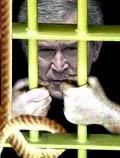| Find |
Saturday, 9 February 2008
G.I. Tells of Ordering Execution of Unarmed Iraqi
A top Army sniper testified Friday in a military court that he had ordered a subordinate to kill an unarmed Iraqi man who wandered into their hiding position near Iskandariya, then planted an AK-47 rifle near the body to support his false report about the shooting.
Under a grant of immunity, the sniper, Sgt. Michael A. Hensley, an expert marksman and sniper trainer, testified in the court-martial of Sgt. Evan Vela. Sergeant Vela is accused of murder, impeding a military investigation and planting evidence to cover up an unjust shooting. An earlier charge of premeditated murder was dropped.
Sergeant Vela is the third soldier to be charged in the death of the Iraqi, Genei Nesir Khudair al-Janabi, last May. Sergeant Hensley and another soldier, Specialist Jorge G. Sandoval Jr., were acquitted of murder charges last year, but were convicted of planting evidence. As part of his sentence, Sergeant Hensley was demoted from staff sergeant.
All three soldiers were elite snipers with the 501st Infantry Regiment, Fourth Brigade (Airborne), 25th Infantry Division, based at Fort Richardson, Alaska.
The military trials have highlighted a secret baiting program, begun in early 2007, in which snipers placed lures like fake explosives or other weaponry to draw insurgents into the open, where they could be killed.
But Sergeant Hensley’s testimony at the base here suggested that by last spring, in addition to baiting and killing, soldiers had added a new tactic: carrying weapons to plant on bodies to deter prosecution.
Sergeant Vela’s lawyer, James Culp, of Austin, Tex., did not dispute that his client had shot and killed Mr. Janabi, but emphasized the battlefield stresses the soldiers endured. Mr. Culp argued that Sergeant Vela had had only a few hours of sleep over three days of constant operations.
Mr. Culp also said his client’s superiors pressed his squad to increase their kill rate, while holding out the threat of prosecution for unjust shootings. NY Times
Posted at
12:13
![]()
Post Title: G.I. Tells of Ordering Execution of Unarmed Iraqi
![[Zionazis-1.jpg]](https://blogger.googleusercontent.com/img/b/R29vZ2xl/AVvXsEg_x8DOGucgHQmfJJujuK_oYJdxhEnskhQqt-Og7lSk52HeaDQYzW8NQWfdpHmPgj_FJN0jJ3tz1prR1jVZHdHky2HDQxxcs4LVxX0DtAt3fG0sfRr6MDx7Sz8cJNjl0k0RS9TbCjangQ/s1600/Zionazis-1.jpg)




